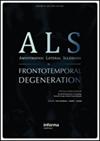Author response to a Letter to the Editor entitled: Preventive effect of coffee and tea on amyotrophic lateral sclerosis
IF 2.5
4区 医学
Q2 CLINICAL NEUROLOGY
Amyotrophic Lateral Sclerosis and Frontotemporal Degeneration
Pub Date : 2019-08-27
DOI:10.1080/21678421.2019.1655061
引用次数: 0
Abstract
We thank Dr Kawada for highlighting the results of our case-control studies (1,2) that suggest a preventive effect of coffee and tea on ALS risk. Our data find support from the consistency of the results from two independent studies and the purported mechanism of the association, derived from animal and cell models (3). In addition, the analogy of the results from studies in patients with Parkinson’s disease and, to some extent, with Alzheimer’s disease (4,5) enforces the positive effects of caffeine and other coffee derivatives against neurodegeneration. However, we also convene with Dr Kawada that the results of our studies were not confirmed by a large multi-cohort study that used mortality for ALS among exposed and unexposed individuals (6). As acknowledged by the authors, the use of ALS mortality as a proxy for the incidence of the disease could lead to an underestimation of the risk, the educational level of the cohort was high and not truly representative of the underlying populations, and measurement errors in estimating caffeine intake could not be excluded. As no definite conclusions can be drawn from the present findings on the protective role of coffee against ALS and other neurodegenerative diseases, we convene with Dr Kawada on the need to plan and undertake a prospective study comparing coffee users and non-users, measuring the quantity of caffeine intake, and assessing the incidence of ALS, Parkinson’s and Alzheimer’s disease during follow-up among exposed and unexposed individuals.作者对题为“咖啡和茶对肌萎缩性侧索硬化症的预防作用”的致编辑信的回复
我们感谢Kawada博士强调了我们的病例对照研究的结果(1,2),这些研究表明咖啡和茶对ALS风险具有预防作用。我们的数据得到了两项独立研究结果的一致性以及从动物和细胞模型中得出的关联机制的支持(3)。此外,在帕金森病患者和阿尔茨海默病患者的研究结果的相似性(4,5)加强了咖啡因和其他咖啡衍生物对神经退行性疾病的积极作用。然而,我们也召集了Kawada博士,我们的研究结果并没有得到大型多队列研究的证实,该研究使用ALS暴露和未暴露个体的死亡率(6)。正如作者所承认的,使用ALS死亡率作为该疾病发病率的代表可能会导致风险低估,队列的教育水平很高,不能真正代表潜在人群。估计咖啡因摄入量的测量误差也不能排除。由于目前的研究结果无法得出关于咖啡对ALS和其他神经退行性疾病的保护作用的明确结论,我们与Kawada博士一起讨论了计划和开展一项前瞻性研究的必要性,该研究比较了咖啡使用者和非咖啡使用者,测量了咖啡因摄入量,并评估了接触者和未接触者在随访期间的ALS、帕金森病和阿尔茨海默病的发病率。
本文章由计算机程序翻译,如有差异,请以英文原文为准。
求助全文
约1分钟内获得全文
求助全文
来源期刊

Amyotrophic Lateral Sclerosis and Frontotemporal Degeneration
CLINICAL NEUROLOGY-
CiteScore
5.40
自引率
10.70%
发文量
64
期刊介绍:
Amyotrophic Lateral Sclerosis and Frontotemporal Degeneration is an exciting new initiative. It represents a timely expansion of the journal Amyotrophic Lateral Sclerosis in response to the clinical, imaging pathological and genetic overlap between ALS and frontotemporal dementia. The expanded journal provides outstanding coverage of research in a wide range of issues related to motor neuron diseases, especially ALS (Lou Gehrig’s disease) and cognitive decline associated with frontotemporal degeneration. The journal also covers related disorders of the neuroaxis when relevant to these core conditions.
 求助内容:
求助内容: 应助结果提醒方式:
应助结果提醒方式:


